Are you a parent who is thinking of how to save for your child’s post-secondary education? The RESP is a long-term savings plan to help people save for a child’s education after high school, including trade schools, CEGEPs, colleges, universities, and apprenticeship programs.
The best part is that anyone can open an account for a child – parents, guardians, grandparents, other relatives, and friends.
Are you an adult planning a change in career and going back to school? Save up by opening an RESP for yourself.
When you open an RESP, you can ask your financial institution to apply for benefits like the Canada Learning Bond (CLB) and the Canada Education Savings Grant (CESG). If the child is eligible, these benefits will be received in the RESP to help with the cost of the child’s education. Eligible expenses can include tuition, books, tools, transportation, and rent.
Canada Learning Bond highlights:
– provides up to a lifetime maximum of $2,000 for each eligible child from families with low income ;
– no contributions to the RESP are needed to get the CLB;
– beneficiary receives $500 the first year they’re eligible, then another $100 each eligible year after that until the age of 15 ;
– retroactive (you can apply for previous years, if you didn’t in the past). The beneficiary can still be eligible to receive it up to the day before they turn 21.
Canada Education Savings Grant highlights:
– provides up to a lifetime maximum of $7,200 to an RESP;
– adds a maximum of $500 to an RESP each year, and up to another $100 for eligible families with middle- and low-income;
– available until the end of the calendar year that the beneficiary turns 17.
To learn more about RESPs and related benefits, visit canada.ca/education-savings.
Information source from Canada Revenue Agency (CRA)

